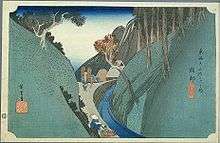Okabe-juku

Okabe-juku (岡部宿 Okabe-juku) was the twenty-first of the fifty-three stations of the Tōkaidō. It is located in what is now the city of Fujieda, Shizuoka Prefecture, Japan. Between Okabe-juku and the preceding post station of Mariko-juku runs Route 1, which was part of the ancient trade route.
History
Though most post stations along the Tōkaidō were built the first year the route was established; however, Okabe-juku was built one year later in 1602.[1] It only had a population of 16 when it was first established and even by 1638], there were only 100 people in the town, making it a rather small post town; however, it was still able to flourish.[1]
The classic ukiyoe print by Ando Hiroshige (Hoeido edition) from 1831-1834 depicts a mountain stream between steep green banks, with the roadway a narrow path walled in on one side by a stone wall.
Okabe-juku's hatago, Kashiba-ya, prospered during the Edo period; however, it was destroyed by fire in 1834. After it was rebuilt in 1836, it was eventually named nationally designated Important Cultural Property.[2] In 2000, it was reopened as an archives museum.[2]
Neighboring post towns
- Tōkaidō
- Mariko-juku - Okabe-juku - Fujieda-juku
Further reading
- Carey, Patrick. Rediscovering the Old Tokaido:In the Footsteps of Hiroshige. Global Books UK (2000). ISBN 1-901903-10-9
- Chiba, Reiko. Hiroshige's Tokaido in Prints and Poetry. Tuttle. (1982) ISBN 0-8048-0246-7
- Taganau, Jilly. The Tokaido Road: Travelling and Representation in Edo and Meiji Japan. RoutledgeCurzon (2004). ISBN 0-415-31091-1
References
| Wikimedia Commons has media related to Okabe-juku. |
- 1 2 Okabe-machi Shōkōkai. Okabe Chamber of Commerce and Industry. Accessed November 17, 2007.
- 1 2 Okabe-machi Yakuba. Okabe Town Hall. Accessed November 17, 2007.